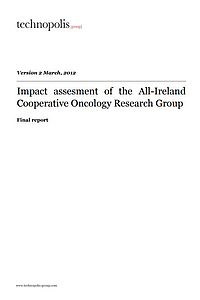Published: 02 March 2012
Impact assessment of the All-Ireland Cooperative Oncology Research Group
The All-Ireland Cooperative Oncology Research Group (ICORG) was set up in 1996 to create more research opportunities for clinical trials in the field of oncology. Up until 2011, ICORG has received €36.5 million to build capacity for cancer clinical trials in Ireland from the Health Research Board (HRB). Besides funding from HRB, ICORG also receives funding from the Irish Cancer Society. ICORG is based on the cooperative group model, with a large number of hospitals participating in the HRB funded programme. ICORG is coordinated by its group central office (GCO), which also received a grant to develop its capacity. The HRB asked Technopolis to perform an impact assessment of ICORG and get a better understanding of the environment that ICORG operates in. This assessment should provide information for an internal funding decision and whether or not the HRB’s strategic objectives of ICORG funding should be revised or extrapolated in any way after 2012.
The specific objectives of the impact assessment are:
- To assess the impact of ICORG on cancer clinical research in Ireland.
- To capture impacts of ICORG to date on cancer care and clinical practice.
- To identify, capture and analyse some defined indicators concerning the economic impact of ICORG and cancer clinical trials.
- To engage with cancer care policymakers and clinical practice leaders in order to identify strategic opportunities by which any future HRB funding of ICORG may have an impact on cancer care policy and practice in Ireland.
A number of the expected outputs of ICORG’s activities include the increased quantity of clinical cancer studies in Ireland; an increased number of professionals working in hospitals on clinical cancer research; an increased training opportunities for cancer clinical studies in Ireland; an increased number of (high-impact) publications and (international) presentations based on cancer clinical studies in Ireland and an increased number of (and rate) patients participating in clinical studies in Ireland. Some of the expected outcomes of ICORG’s efforts are an increased number of new/improved treatments and/or diagnostics introduced into the clinical practice in Ireland; an increased income generated by industry-sponsored studies; an increased leveraged funding for cancer clinical trials in Ireland over the years from public and private sources (non-exchequer); developed guidelines and standards for clinical cancer research in Ireland. Expected, longer-term impacts of ICORG’s efforts are increased quality of the clinical cancer research in Ireland; improved standards of clinical care in Ireland; improved benefits for cancer patients in Ireland; increased attractiveness of Ireland for cancer clinical research (for industry and world-class physicians).
A full table of indicators is provided in the report.

